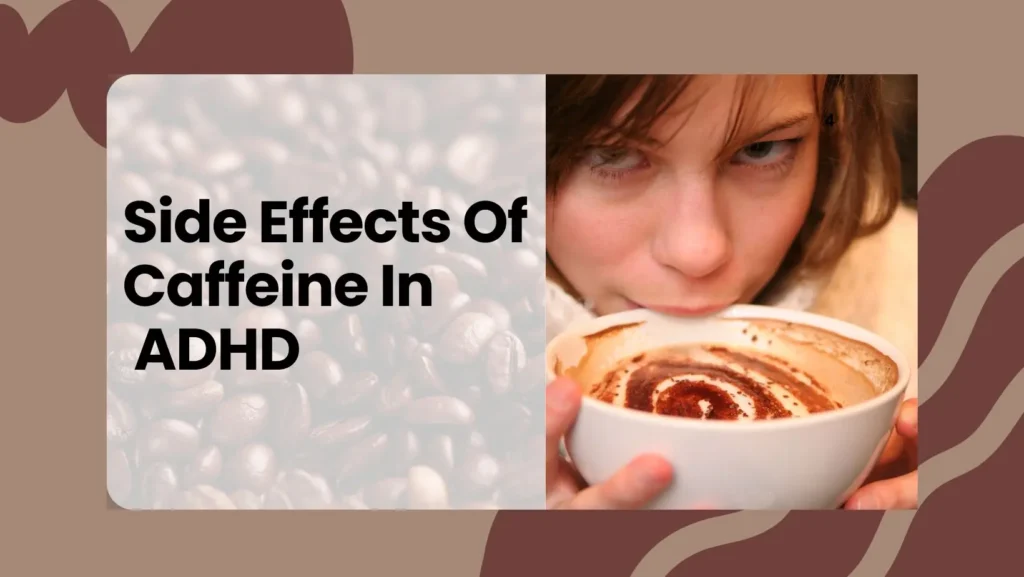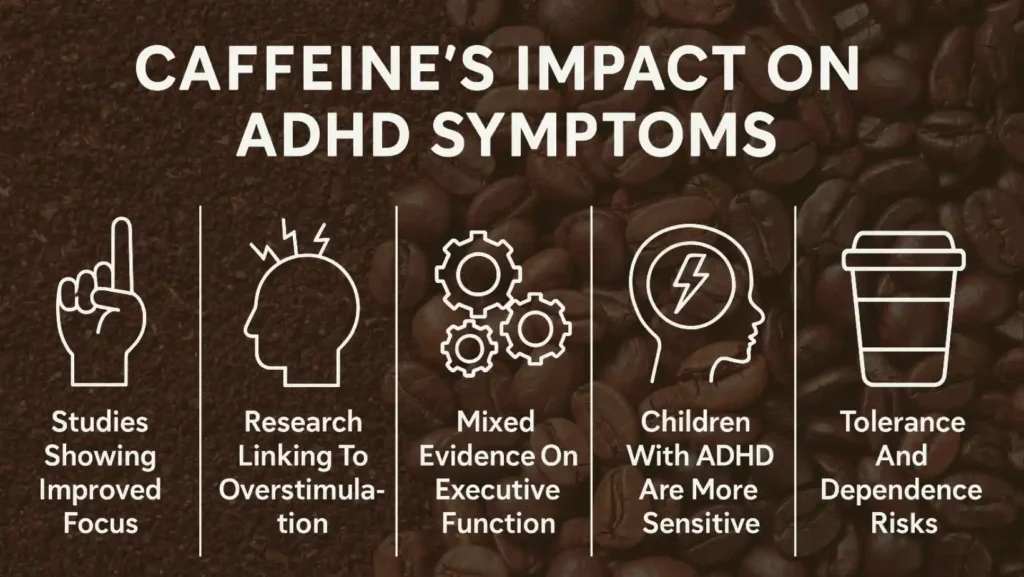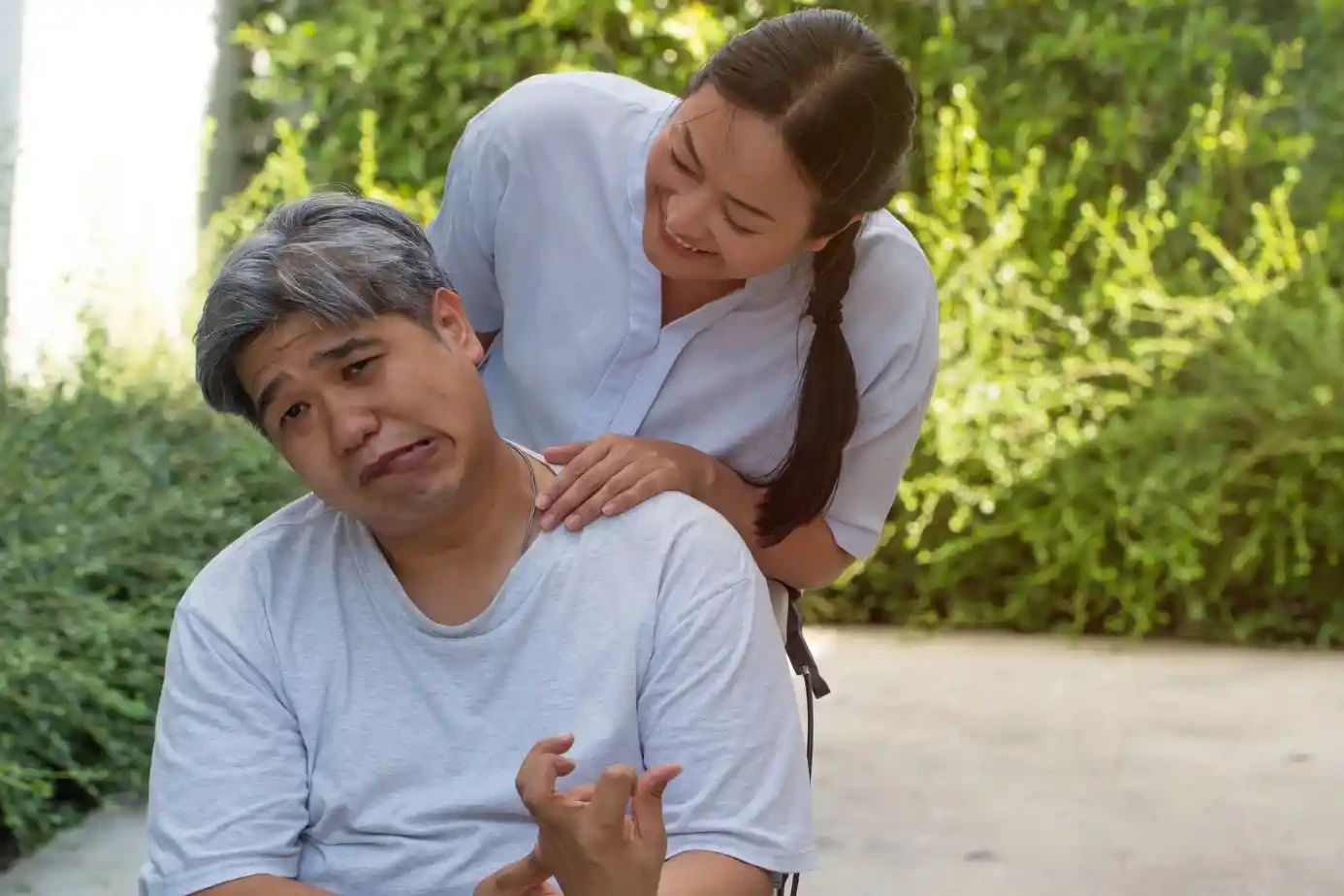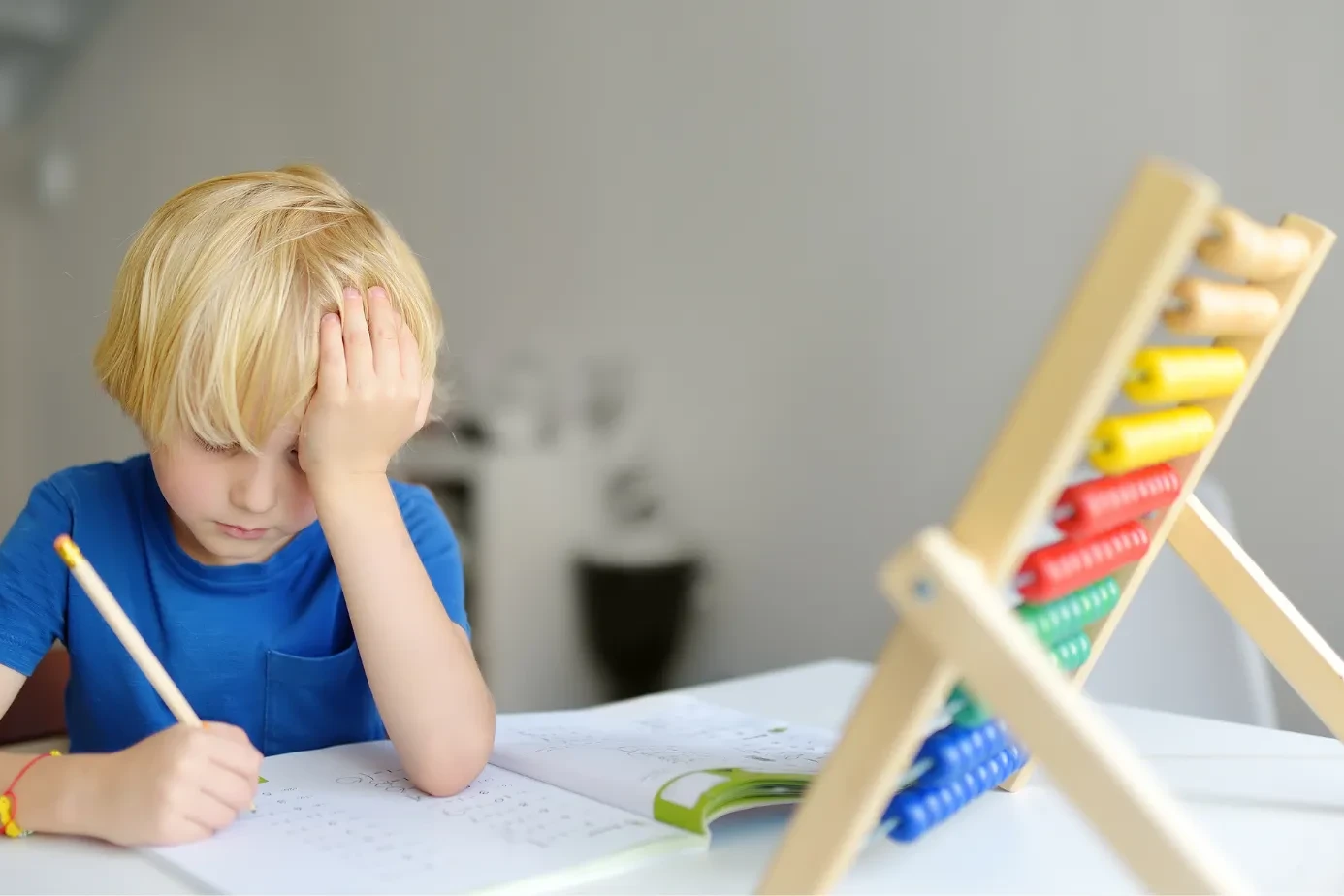In many people with attention-deficit/hyperactivity disorder (ADHD), caffeine can offer a short boost of focus or alertness by acting as a mild stimulant. But the truth is, the effects of caffeine on ADHD people vary widely, may not match prescription treatments, and carry risks. Let’s explore what happens when caffeine meets ADHD.
Table of Contents
ToggleWhat Is Caffeine And How It Works
Caffeine is a chemical found naturally in coffee beans, tea leaves, cocoa beans, and some sodas. When you drink caffeine, it enters your bloodstream and goes to your brain.
It does three big things: blocks adenosine receptors (which help you feel sleepy), increases chemicals like dopamine and norepinephrine (which help you feel alert), and speeds up nerve-cell signalling.
Caffeine affects ADHD by blocking the “sleepy signal” of adenosine, so you feel awake and quicker to react. Because it nudges dopamine and norepinephrine, you may feel more motivated or focused. These are the same brain chemicals that are involved in ADHD.
How Caffeine Acts As A Natural Stimulant
Caffeine raises your brain’s general level of arousal (wakefulness). That means you may feel less tired, more engaged, or able to start a task more easily.
Blocking Adenosine Receptors To Boost Alertness
Adenosine is a brain chemical that builds up while you’re awake and makes you sleepy. Caffeine attaches to adenosine receptors instead of adenosine itself. That means you feel less sleepy, your brain cells fire more, and you feel more alert.
Role Of Dopamine And Norepinephrine Activation
Dopamine helps you pay attention, feel rewarded, and stay motivated. Norepinephrine helps with alertness and responding to your environment. Caffeine elevates both slightly. For someone with ADHD, whose dopamine circuits may be weaker or less responsive, this boost can feel beneficial.
How Caffeine Mimics Mild ADHD Medication Effects
Many ADHD medications are strong stimulants that directly increase dopamine and norepinephrine in specific brain areas. Caffeine is much weaker and less precise, but in effect, it mimics a tiny dose of those meds. That explains why some people with ADHD try caffeine to help. But it also explains why it is not a replacement for real medication.
The Connection Between Caffeine And ADHD
So if caffeine gives a boost, why isn’t it the go-to for ADHD? Because ADHD brains work differently. The impact of caffeine varies depending on your biology, medication use, sleep, timing, and more. Understanding how caffeine affects ADHD means seeing those differences clearly.
Why Caffeine Affects ADHD Brains Differently
People with ADHD often have altered dopamine and norepinephrine signalling. Their brain circuits for focus, planning, and inhibition (stopping impulses) do not work the same. Caffeine may give a boost in alertness, but it may not reach the key brain circuits that the prescribed stimulant medication targets.
Dopamine Deficiency And Caffeine’s Temporary Boost
Because caffeine raises dopamine and norepinephrine modestly, you might experience a short-term improvement in focus or energy. But this boost is temporary. If your ADHD involves major deficits in executive function (planning, prioritizing, organizing), caffeine alone usually falls short.
Short-Term Benefits
Many people with ADHD report that a cup of coffee or tea helps them feel more ready to start work or school. In tasks that are short or simple, caffeine can reduce mental fog, raise alertness, improve reaction time, and help with motivation.
When Caffeine Worsens Hyperactivity Or Impulsivity
On the flip side, caffeine may worsen symptoms in some cases. If you have hyperactivity or impulsivity, caffeine’s stimulating effect can amplify those traits: you might feel jittery, restless, more talkative, more distracted, or less able to calm down.
Individual Factors
Your genes influence how you break down caffeine, how sensitive you are to it, and how long it stays in your system. Also, regular caffeine use builds tolerance. That means you need more to feel the same effect, and that can reduce benefits or raise the risk of side effects. If you have poor sleep, anxiety, medication use, or heart issues, caffeine’s effect will differ.
Potential Benefits Of Caffeine For ADHD
Given the connection, what benefits might caffeine bring for ADHD? They are modest, but real in certain cases.
Improves Alertness And Reaction Time
Research shows caffeine boosts simple attention tasks and reaction time in people with ADHD. Animal studies and small human studies support this.
Enhances Dopamine And Serotonin Briefly
By increasing dopamine and to some extent serotonin (a mood-regulating chemical), caffeine may lift mood and reduce some mental fog. That can create a platform for better focus.
Increases Sustained Attention In Short Bursts
Caffeine may help you focus for a short period, say, a few minutes to a couple of hours, on a task you find boring or difficult. That burst can help you start or keep going.
Reduces Fatigue And Mental Fog
If you feel sleepy, mentally sluggish, or worn down, caffeine can help you feel more energetic and clear-headed, especially when ADHD makes fatigue worse.
A Natural Option For Mild ADHD Symptoms
If your ADHD symptoms are mild and you use other strategies (structure, sleep, diet, movement), caffeine can serve as an additional tool. It gives modest support without prescription-strength effects.
Using Caffeine Alongside Non-Medication Strategies
Because caffeine is not a treatment, it works best with non-medication strategies: good sleep hygiene, chunks of focused time, movement breaks, healthy diet. When you combine caffeine with those, you may notice better results.
Caffeine vs ADHD Medication
Caffeine cannot replace ADHD medication. Understanding caffeine and ADHD medication helps you see how they differ.
How Caffeine Differs From Adderall Or Ritalin
Medications such as methylphenidate (Ritalin) or amphetamines (Adderall) are engineered to target brain circuits precisely and maintain a consistent effect over hours. Caffeine is non-specific, weaker, and has a shorter effect window.
Potency, Duration, And Effect Comparison
Medication may offer 4–12 hours of controlled effect at a dose set by a doctor. Caffeine works for 1–3 hours (for many people), and the effect varies widely. Caffeine’s dose is less controlled (a cup vs a milligram-dose tablet). Its effect is weaker, less predictable.
Why Caffeine Can’t Replace Prescribed Treatment
Because caffeine cannot reliably treat the full range of ADHD symptoms, especially executive function deficits, learning issues, and sustained focus, it cannot replace prescription therapy. Research consistently finds that ADHD meds are far more effective than caffeine alone.
Safe Combination Under Medical Guidance
In some cases, doctors permit low caffeine use alongside medication, but it must be monitored. Combining caffeine and strong stimulants increases the risk of side effects (heart rate increase, anxiety, insomnia).
Why Overuse Can Increase Side Effects
If you rely on caffeine heavily, side effects mount: jitteriness, insomnia, crash, and dependence. Plus, you may build tolerance, reducing the beneficial effect while increasing risk. Studies show people with ADHD may be more prone to problematic caffeine use.
Side Effects Of Caffeine In ADHD

If caffeine has potential benefits, it also has real risks, especially in ADHD.
Increased Heart Rate Or Jitters
Because caffeine stimulates your system, you may feel your heart race, your hands tremble, or your body shake. For some people with ADHD, these feelings make focus even worse.
Heightened Anxiety Or Restlessness
If you already struggle with anxiety or restlessness (common in ADHD), caffeine may worsen these. You might feel more nervous, more panicky, or less calm.
Sleep Disruption And Energy Crash
Caffeine can delay falling asleep, reduce sleep quality, and shorten sleep time. Poor sleep makes ADHD symptoms worse. After caffeine wears off, you may also crash, feeling tired, unfocused, and moody.
Worsening Of Impulsivity Or Mood Swings
Instead of helping focus, caffeine may increase impulsivity (acting without thinking) or irritability. This is especially true if you overshoot the dose or combine with other stimulants.
Withdrawal Symptoms From Overuse
If you use caffeine regularly and then stop, you might experience headaches, heavy fog, fatigue, and mood changes, all of which impair focus and ADHD control.
Emotional And Behavioral Side Effects
High caffeine intake may trigger mood swings, worse behavior at school or work, difficulty sitting still, or trouble regulating emotions; things ADHD treatment tries to control.
Research: Caffeine’s Impact On ADHD Symptoms
Evidence shows mixed results, modest effects, and strong cautions about caffeine’s impact on ADHD.
Studies Showing Improved Focus And Alertness
Some studies found caffeine improved attention, memory, and learning in models of ADHD and in small human trials.
Research Linking Caffeine To Overstimulation
Other studies found caffeine increased movement, restlessness, and sleep problems, and did not reliably reduce core ADHD symptoms like impulsivity or planning deficits.
Mixed Evidence On Executive Function Improvement
Executive functions are tasks like organising, planning, and switching attention. Caffeine’s effect here is weak or inconsistent. Some trials show little benefit.
Why Children With ADHD Are More Sensitive
Children metabolise caffeine differently, may get stronger effects or longer duration, and are more vulnerable to sleep disruption and behavioural impact.
Tolerance And Dependence Risks Over Time
Habitual caffeine users may develop decreased response or increased side effects. In ADHD people this pattern is more common.
Safe Caffeine Use For ADHD
If you decide to use caffeine to support ADHD symptoms, you must do so carefully. Here’s how to make it safer.
Recommended Daily Limits For Adults And Teens
For most healthy adults, up to 400 mg of caffeine per day is considered safe (about four cups of coffee). Teens should keep much lower, often less than 100 mg per day. Children should use avoidance or very minimal amounts. For ADHD, staying well under those limits is wise due to sensitivity.
Best Time Of Day For Caffeine Intake
Drink caffeine early in the day, within the first few hours after waking. Avoid afternoon or evening use. That gives your body time to process it and helps protect your sleep.
Avoiding Afternoon Energy Crashes
If you rely on caffeine late in the day, you may interfere with sleep and set yourself up for a crash. Better to stop by early afternoon and use other strategies (hydration, snack, movement) later.
Sleep Quality Outweighs Caffeine Quantity
Good sleep beats caffeine. If you sleep poorly, ADHD symptoms worsen. Fix your sleep schedule, reduce screen time before bed, and keep caffeine use appropriate. Using caffeine to “compensate” for bad sleep is counterproductive.
Safer Options
Lower-dose caffeine sources (green tea, matcha) deliver less caffeine and often include L-theanine, which may soften the “jitter” effect. If you want a mild boost, these are preferable to large mugs of coffee or energy drinks.
When To Avoid Caffeine With ADHD
There are times when caffeine is more harmful than helpful. Knowing when is critical.
Combining With Stimulant Medication (Adderall, Vyvanse)
If you’re on prescription stimulant medication for ADHD, adding caffeine increases the risk of side effects: high heart rate, insomnia, and anxiety. Always talk to your doctor before combining.
When You Have Anxiety
If you already struggle with anxiety, panic, sleep disorders, high blood pressure or heart issues, caffeine adds risk. It may worsen all these and amplify ADHD symptoms indirectly.
Interactions With Antidepressants Or Other Drugs
Caffeine can change how medicines are absorbed or processed. In ADHD treatment, it might increase side effects or alter the effect. Tell your doctor about all medications and caffeine habits.
Signs Of Overuse
If, after caffeine, you feel a fast heart rate, shaky hands, trouble sleeping, mood swings, or a crash the next day, those are signs you’ve gone too far. Cut back or stop.
Caffeine And Sleep In ADHD
Sleep and ADHD are deeply connected. Caffeine changes your sleep, and that changes your ADHD symptoms.
Why ADHD Affects Sleep Cycles And Melatonin
ADHD often involves delayed or disrupted sleep patterns. Your body’s melatonin (sleep hormone) rhythm may be shifted, and you may fall asleep later, wake up more. This means sleep problems are both cause and effect of ADHD.
How Caffeine Delays Natural Sleep Rhythms
Caffeine blocks adenosine and delays the buildup of sleep pressure. If you drink caffeine in the afternoon or evening, it delays the time you feel sleepy, reduces sleep quality, and increases wakefulness during the night
Ideal Caffeine Cut-Off Time
To protect your sleep, stop caffeine no later than early afternoon, many experts say by 2 p.m. At that point, your body can clear enough caffeine before bed so you have normal sleep onset and depth.
Reset Sleep After Caffeine-Induced Insomnia
If caffeine has ruined your sleep (you stayed up late, woke up tired), reset by skipping caffeine for 1-2 days, keep a regular sleep schedule, avoid screens in the last hour before bed, use dim light in the evening, and wake at the same time daily.
Non-Caffeine Ways To Stay Energized
Rather than reaching for caffeine in an afternoon slump, try: drinking water (dehydration worsens focus), eating a protein snack (steady energy), taking a short walk, or stretching (boosts circulation). These support attention naturally without disturbing sleep.
Does Caffeine Help ADHD In Children?
Many adults wonder about kids and caffeine in ADHD. The answer is cautious: research is weak, and risks may outweigh benefits.
Summary Of Research In Kids And Teens
Some small trials found slight improvements in attention or planning in children with ADHD when given caffeine; other trials found no benefit or worse behaviour.
Why Results Are Inconsistent
Children metabolise caffeine differently from adults. Dose matters. Age, body weight, and developmental stage change effects. Also, children are more vulnerable to sleep disruption and behavioural side effects.
Risks Of Using Caffeine For ADHD In Children
Risks include poorer sleep, increased hyperactivity, mood swings, and higher sensitivity to caffeine’s stimulant effect. Because of this, caffeine is not recommended as a primary treatment in children.
Medical Guidelines For Parents And Caregivers
Parents should talk to paediatricians before offering caffeine to children with ADHD. Some guideline sources say caffeine is not approved or recommended to treat ADHD in children.
Caffeine And ADHD: Myths Vs Facts
| Myth | Fact |
| “Caffeine cures ADHD.” | Caffeine can give a temporary boost in alertness or focus, but does not treat or cure ADHD. Its effects are short and mild compared to medication. |
| “Caffeine works exactly like Ritalin.” | Both caffeine and stimulant medication affect dopamine, but caffeine and ADHD medication show major differences. Medications are stronger, longer-lasting, and more targeted. |
| “Energy drinks help ADHD.” | Energy drinks often contain excessive caffeine and sugar. They can cause anxiety, restlessness, and poor sleep, worsening ADHD symptoms instead of improving them. |
| “If caffeine doesn’t help, you don’t have ADHD.” | Response to caffeine varies. Some people with ADHD feel calmer or more focused, while others get anxious or restless. Lack of benefit doesn’t mean you don’t have ADHD. |
FAQs
How does caffeine affect focus in ADHD?
Caffeine can raise alertness and reaction speed in people with ADHD, giving short-term improvements in focus, especially on simple tasks, but it rarely improves deeper planning or long tasks.
When is the best time to drink caffeine with ADHD?
The best time is early in the day, ideally soon after waking, and avoid caffeine late afternoon or evening so you protect your sleep and avoid crash effects.
Can caffeine replace ADHD medication?
No. Caffeine cannot match the potency, precision, and duration of prescribed ADHD medication; it may help with small parts of attention, but it cannot serve as the same treatment.
How much caffeine is safe for adults with ADHD?
For many adults, staying under about 400 mg a day is considered safe; for ADHD use, you might aim lower, such as one or two small cups of coffee, and always consider sleep impact and sensitivity.
Can caffeine worsen anxiety or sleep problems?
Yes. Especially in ADHD, caffeine can raise anxiety, increase restlessness, interfere with sleep onset and quality, and worsen symptoms when used too late or in high amounts.
Does caffeine work differently for each ADHD type?
Yes. People whose ADHD is mostly inattentive may gain some benefit from caffeine’s alertness boost; those whose ADHD is marked by hyperactivity/impulsivity may find caffeine worsens those symptoms.
Are there safer caffeine alternatives for focus?
Yes. Lower‐dose caffeine sources like green tea or matcha include smaller amounts of caffeine plus calming compounds like L-theanine. They may offer milder focus support with less risk of jitter or sleep disruption.
What are the signs of too much caffeine in ADHD?
Look out for heart palpitations, shaky hands, trouble sleeping, irritability, mood swings, crash after the effect wears off, and need for increasing doses. These suggest overuse.
Should you talk to a doctor before using caffeine regularly?
Yes. Especially if you take ADHD medication, have heart issues, sleep problems or anxiety, you should ask a healthcare provider how caffeine fits your overall treatment plan.
About The Author

Medically reviewed by Dr. Chandril Chugh, MD, DM (Neurology)
Board-Certified Neurologist
Dr. Chandril Chugh is a U.S.-trained, board-certified neurologist with expertise in diagnosing and managing neurological disorders, including migraines, epilepsy, Parkinson’s disease, and movement disorders. His clinical focus includes evidence-based neurological care and patient education.
All content is reviewed for medical accuracy and aligned with current neurological guidelines.





